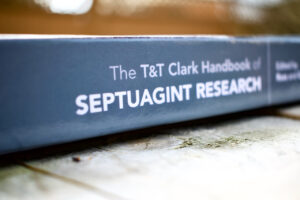A Book Review
Who could have foreseen the current skyrocketing popularity of Septuagint (LXX) scholarship? Recently published resources abound and there are more to come. For friends of the LXX, the only preferable time to live and witness would have been when the Pentateuch was originally translated from Hebrew into Greek. The LXX is an exciting area of interest. But anyone entering the field is immediately confronted by its fascinating yet easily intimidating range of topics. To assist in alleviating this intimidation, editors William A. Ross and W. Edward Glenny along with their well-qualified contributors have performed the tremendous service of delivering The T&T Clark Handbook of Septuagint Research.
The purpose of this book is to give the current state of investigation on the major topics and methods of Septuagint research. It’s intended to be accessible beyond the introductory level. It is also a companion work to the T&T Clark Companion to the Septuagint. There are chapters on subjects you would expect to include social context, translation; technique, textual criticism, and theology. But there are also chapters on discourse grammar, Qumran, and the Eastern Orthodox tradition. Before going any further, I’ll interject now that if you’ve clicked the links to this book or its companion volume, and seen their prices, your sticker shock is understandable. And I will try my best to alleviate it in my closing comments. But first, I’ll explain the book’s structure and value and comment on some specific examples.
Divided into six parts, it treats (1) origins, (2) language, (3) text, (4) reception, (5) theology, translation, and commentary, and (6) survey of literature. (You can view the table of contents here.) As I consider the topics this book addresses, I can’t identify any it fails to address. And it addresses them with skillful care. Each chapter follows a similar outline of introduction, overview, and ongoing research questions, and recommended resources. And the authors have written to be understood by non-experts. They explain their terminology and communicate intelligibly without obfuscation. Whether your interest lies in personal study or academic research, this book is a ready reference to establish the current landscape of understanding and offer suggestions for both further study and needed research.
Because this is an edited volume, I will only comment on only several chapters to offer examples of this book’s helpfulness. Patrick Pouchelle in Chapter 4, “Septuagint Lexicography,” convincingly argues that lexicographical study must be both source-oriented (paying attention to the underlying Hebrew or Aramaic lexemes) and target-oriented (paying attention to its production for Greek-speaking Jews). Both considerations are necessary and sorting where Hebrew and Aramaic interference occur remains fertile ground for ongoing research. José Manuel Cañas Reillo in “The Septuagint and Textual Criticism of the Greek Versions” explains the value of secondary versions (the Vetus Latina, Armenian, Ethiopic, Arabic) as support for variants found in the Greek manuscript tradition. Yet textual criticism of the LXX still requires serviceable critical editions of many of these versions. And, continuing on the theme of textual criticism, Steve Moyise in “The Septuagint in the New Testament” portrays the New Testament as a witness to the first-century text of the LXX, as well as revisions, and recensions. William A. Ross speaks to the debate over modern translation methodology in “The Septuagint and Modern Language Translations.” He positions modern LXX translations along a spectrum of dependence on Hebrew source text. And Jennifer Jones surveys bibliographies, introductions, textual editions, lexicons, grammars and more in “The Septuagint and Contemporary Study.”

I struggle to find fault with this book apart from an occurrence of dittography on page 388 (“Chamberlain’s Chamberlain’s”). It’s instructive, clear, and enjoyable to read. Especially when you combine it with the T&T Clark Companion to the Septuagint, you could not hope for more useful surveys of current LXX scholarship. The biggest obstacle is the price. It would be a shame for a book like this to only be accessible to specialists with stimulus cheques and well-stocked university libraries. My hope is that the publisher will at least make this book available on the Logos Bible Software platform as they did with the T&T Clark Companion to the Septuagint (link here) for a sliver of the in-print cost. If a physical copy is out of reach, an affordable digital copy is a good second option. (The Kindle option from the publisher is cheaper, but still pricey.) In the absence of this potential alternative, those without library access only have expensive options.
This book is a well-executed presentation of every major topic of current LXX studies. It would be appropriate for the student looking for the next step beyond a standard introduction. It is the premier starting point for the advanced student beginning research on any of the topics presented. This book is so good we would do well to conclude with a warning from R. R. Ottley’s A Handbook to the Septuagint, a book Ross and Glenny mention in their preface.
There is little fear but that the learner will soon find means to read about the Septuagint; it is more necessary to urge him to explore, and to read, the text itself (228–229).
An abundance of excellent books on the LXX such as this one may have the undesired effect of keep us from reading the LXX as much as we should! But I’m happy we possess excellent books such as this one that offers top-notch scholarly analysis of our subject matter. This book is yet another important tool that makes this a golden age for friends of the LXX.
Update: This book is now available for pre-order from Logos Bible Software for only $25.99.
Photographs by Brent Niedergall. Special thanks to T&T Clark for providing me with a free review copy of this book. This did not affect my thoughts in any way so far as I am aware.
0 Comments